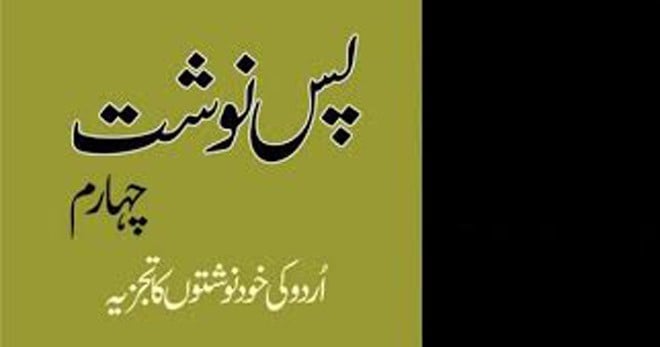

If you have written an autobiography or plan to write one, you better not exaggerate or distort facts, as there is an old man who leaps at every new autobiography and dissects it with his scalpel of a pen. Although he is based in Canada these days, he makes sure he receives all the new memoirs or autobiographies published anywhere in the world.
A retired professor of Urdu with a vast teaching experience, Dr Pervez Parwazi has translated selected Japanese poetry as well as fiction into Urdu. He has edited the memoirs of Sir Zafrullah Khan as well. In 2003, he published the first volume of Pasnavisht in which he dissects autobiographies written in Urdu. Ever since, this initiative has turned into a passion and he has critically analysed almost all the important autobiographies written in Urdu.
The 384-page fourth volume of Pasnavisht introduces readers to many more memoirs and autobiographies. For instance, Justuju Kia Hai by celebrated Intizar Husain. Parwazi gives full marks to Intizar Husain for writing a splendid sequel to Chiragon Ka Dhuwan. He seems enamoured by the prose of Intizar Husain and thus gives him a clean chit.
But Ahmad Hasan Dani is not that lucky. Parwazi thinks Dani should not have meddled with the foreign ministry to highlight the Kashmir issue. In his autobiography, Dani gives sweeping statements regarding the failure of the foreign ministry to highlight the Kashmir issue properly. Now this is something which Perwazi refuses to tolerate as he believes that Dani should not have meddled in the matter about which he knew little. His point is valid.
Parwazi is unreasonably harsh on Raza Ali Abidi whose autobiography Radio Kay Din is a finely written memoir of his broadcasting years. Dr Parwazi disapproves of a remark against a particular religious community.
He is all praise for the autobiography of Kashmiri educationist Agha Ashraf Ali, titled Kuch Tau Likh Kay Log Kehte Hain. He recommends this autobiography to educationists, to learn from the rich experience of a renowned scholar. Another very positive aspect of the autobiography is that it contains a very vivid portrayal of an unsung genius, Daud Rahbar.
Parwazi lashes out hard on his classmate Waqar Bin Elahi, who tries to follow the footsteps of Casanova in his autobiography ‘Maa Mein Thak Gaya Houn’. Also, Elahi alludes to Prof. Hoodbhoy in a negative tone which Parwazi refuses to ignore. He thinks Elahi should have refrained from such comments.
Pasnavisht’s fourth volume is a collection of 67 autobiographies and memoirs, written both by known and unknown personalities. Dr Pervez Parwazi’s approach is mature when disagreeing with authors. But to err is human and one feels at times he fails to give credit where it is due.
Hafeez Siddiqui’s autobiographical essays are a delight to read as they show us the vignettes of an era rich in higher human values. But Parwazi fails to appreciate them.
One feels he gives too much importance to authors with whom he shares his religious background. Take, Abdul Waheed Zafar’s memoir ‘Kasurwar Kaun’. It is nothing unusual. But the way Parwazi waxes lyrical about this mediocre book is quite unbecoming of a serious scholar.
Nevertheless, Dr Pervez Parwazi has done a remarkable job by compiling four volumes on Urdu autobiographies and memoirs. There is every reason to believe that his pen will not run out of ink in the near future. The kind of prose he writes is hard to come by these days. Even Daud Rahbar, a class apart as far as prose is concerned, liked his style in writing prose.